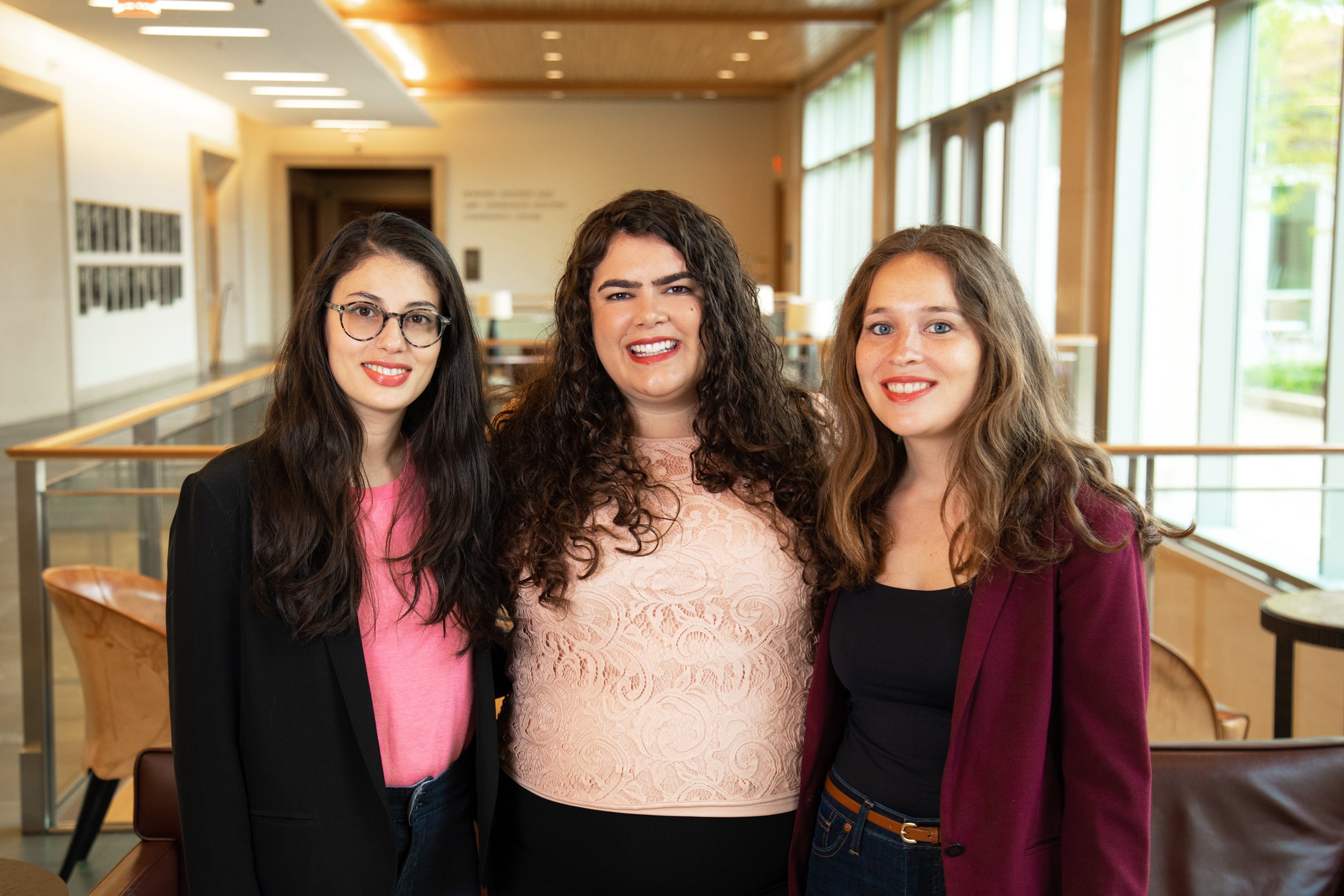Lindsay Bailey ’19, Lisandra Novo ’19 and Elisa Quiroz ’19 are the winners of the team 2019 David Grossman Exemplary Clinical Student Team Award. The award, named in honor of the late Clinical Professor of Law David Grossman ’88, a public interest lawyer dedicated to providing high-quality legal services to low-income communities, recognizes students who have demonstrated excellence in representing individual clients and undertaking advocacy or policy reform projects.
The trio was honored for their exceptional work with the International Human Rights Clinic on a complicated lawsuit, Mamani, et al. v. Sánchez de Lozada and Sánchez Berzaín. The Mamani case was litigated in U.S. federal court on behalf of the family members of Bolivian citizens who were killed by the Bolivian military in 2003. The suit brought claims against Bolivia’s former president and minister of defense for their roles in orchestrating these killings.
Over the course of two years, the students were involved in many aspects of the case — from discovery and depositions, to summary judgment, to a month-long trial, to the current appeal.
Professor Susan Farbstein praised their advanced level of legal analysis, judgment, creativity, and empathy with clients. “Together, Lindsay, Lisandra, and Elisa have demonstrated all the hallmarks of thoughtful, critical, and reflective human rights advocacy,” she said. “They have done it as a team which is, in fact, the only way real change ever happens. Each of them is whip smart, passionate, and committed, and can be depended on to tackle the toughest assignments with rigor and produce the highest quality of work. Yet together, they are even greater than the sum of their individual talents.”
Lindsay Bailey
Lindsay Bailey has long been actively involved in international human rights focused organizations. Prior to HLS, she spent three years in Ghana working with municipal governments to improve project planning, budgeting, and municipal taxes. In Ghana she worked for a variety of organizations, including Engineers Without Borders Amplify Governance, Global Communities, and UNICEF.
Since beginning law school, she has spent four semesters in the International Human Rights Clinic, volunteered with HLS Advocates for Human Rights for two years, and has been a research assistant at the Harvard Law School Program on International Law and Armed Conflict (HLS PILAC). She currently serves as the co-president of the Harvard Law and International Development Society (LIDS).
Bailey spent a winter Independent Clinical with the Public International Law and Policy Group in Jordan as part of the Reginald F. Lewis Internship Program. She also was an article editor on the Harvard Human Rights Journal, and an article editor and community development director for the Harvard International Law Journal, in which she published an article, “Can There Be an Accidental Extrajudicial Killing? Understanding standards of intent in the Torture Victim Protection Act” last August. Next year Bailey will continue her work in human rights litigation at the Center for Justice and Accountability.
Lisandra Novo
Born in Cuba, Lisandra Novo narrowed her interest in international human rights and criminal law early on, focusing particularly on accountability for human rights violations committed by state officials. She was awarded a Chayes Fellowship in 2017 to work at the Inter-American Court of Human Rights in San José, Costa Rica. There she worked primarily on cases related to the justiciability of social, cultural and economic rights. In her first year at HLS, she was a member of the Harvard Immigration Project’s Removal Defense Project (HIP’s RDP), an interpreter for the Harvard Immigration and Refugee Clinical Program (HIRC), co-communications chair for the Harvard European Law Association (HELA), and an article editor for the Harvard International Law Journal’s Online Symposium on the crime of aggression. She spent the fall semester of her third year at the Graduate Institute for International Law and Development in Geneva, Switzerland. Novo and Quiroz both participated in a spring break pro bono trip in Puerto Rico for hurricane relief work in March 2019. After graduation she will be conducting independent research on enforced disappearances in Spain as a Fulbright Fellow.
Elisa Quiroz
Elisa Quiroz had an interest in pursuing a career in international human rights work long before coming to HLS. Her childhood in Chile exposed her to human rights issues early on. “If you grow up in a country that has lived through a dictatorship, you hear the stories all the time, and that makes human rights law very tangible in a way that maybe countries that are more removed from that experience don’t know,” she told Harvard Law Today. In 2017, Quiroz was also awarded a Chayes Fellowship to work in the Office of the United Nations High Commissioner for Human Rights in Geneva (OHCHR). At OHCHR, Quiroz worked on projects with the UN Special Rapporteurs on freedom of expression, independence of judges and lawyers, the right to health, and the right to education. During her 2L year, she was awarded a Human Rights Program travel grant to conduct research in Chile examining the government’s legislative and policy responses to the country’s rapid rise in migration. Next year, she will be working as a legal fellow at TRIAL International in Geneva, Switzerland.
